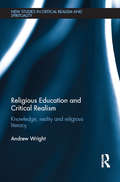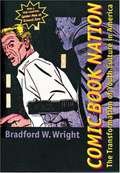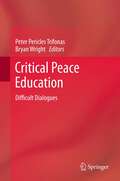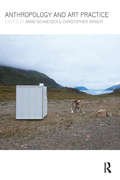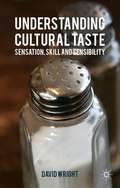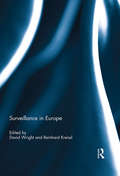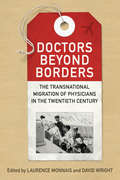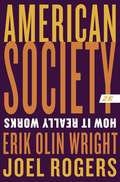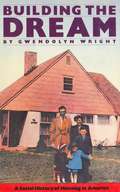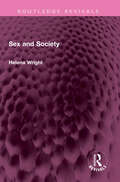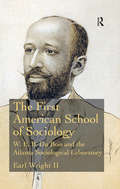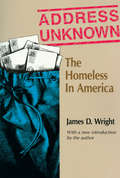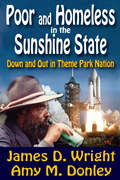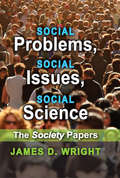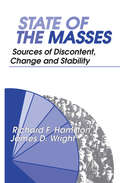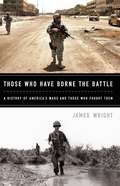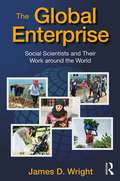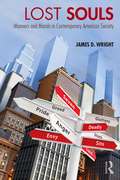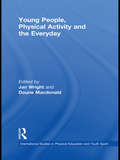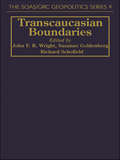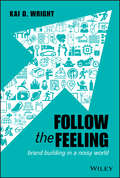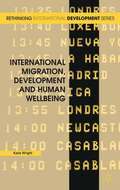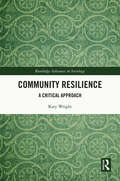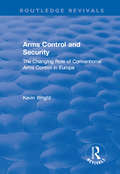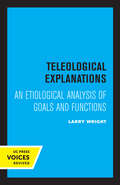- Table View
- List View
Religious Education and Critical Realism: Knowledge, Reality and Religious Literacy (New Studies in Critical Realism and Spirituality (Routledge Critical Realism))
by Andrew WrightReligious Education and Critical Realism: Knowledge, Reality and Religious Literacy seeks to bring the enterprise of religious education in schools, colleges and universities into conversation with the philosophy of Critical Realism. This book addresses the problem, not of the substance of our primal beliefs about the ultimate nature of reality and our place in the ultimate order-of-things, but of the process through which we might attend to questions of substance in more attentive, reasonable, responsible and intelligent ways. This book unpacks the impact of modern and post-modern thought on key topics whilst also generating a new critically realistic vision. Offering an account of the relationship between Religious Education and Critical Realism, this book is essential reading for students, scholars and practitioners interested in philosophy, theology and education.
Comic Book Nation: The Transformation of Youth Culture in America
by Bradford W. WrightAs American as jazz or rock and roll, comic books have been central in the nation's popular culture since Superman's 1938 debut in Action Comics #1. Selling in the millions each year for the past six decades, comic books have figured prominently in the childhoods of most Americans alive today. In Comic Book Nation, Bradford W. Wright offers an engaging, illuminating, and often provocative history of the comic book industry within the context of twentieth-century American society. From Batman's Depression-era battles against corrupt local politicians and Captain America's one-man war against Nazi Germany to Iron Man's Cold War exploits in Vietnam and Spider-Man's confrontations with student protestors and drug use in the early 1970s, comic books have continually reflected the national mood, as Wright's imaginative reading of thousands of titles from the 1930s to the 1980s makes clear. In every genre-superhero, war, romance, crime, and horror comic books-Wright finds that writers and illustrators used the medium to address a variety of serious issues, including racism, economic injustice, fascism, the threat of nuclear war, drug abuse, and teenage alienation. At the same time, xenophobic wartime series proved that comic books could be as reactionary as any medium. Wright's lively study also focuses on the role comic books played in transforming children and adolescents into consumers; the industry's ingenious efforts to market their products to legions of young but savvy fans; the efforts of parents, politicians, religious organizations, civic groups, and child psychologists like Dr. Fredric Wertham (whose 1954 book Seduction of the Innocent, a salacious exposé of the medium's violence and sexual content, led to U. S. Senate hearings) to link juvenile delinquency to comic books and impose censorship on the industry; and the changing economics of comic book publishing over the course of the century.
Critical Peace Education: Difficult Dialogues (Routledge Research In Education)
by Bryan Wright Peter Pericles TrifonasForward-thinking pedagogues as well as peace researchers have, in recent decades, cast a critical eye over teaching content and methodology with the aim of promulgating notions of peace and sustainability in education. This volume gives voice to the reflections of educational theorists and practitioners who have taken on the task of articulating a 'curriculum of difference' that gives positive voice to these key concepts in the pedagogical arena. Here, contributors from around the world engage with paradigm-shifting discourses that reexamine questions of ontology and human subjectivity--discourses that advocate interdisciplinarity as well as the reformulation of epistemological boundaries. Deconstructing the origins and limits of human knowledge and learning, the book affords educators the opportunity to identify and express common elements of the subjects taught and studied in educational institutions, elements that facilitate students' apprehension of peace and sustainability. With penetrating analysis of contemporary issues in the field, this volume introduces a range of fresh theoretical approaches that extend the boundaries of peace education, which is broadly defined as promoting the responsible, equitable and sustainable co-existence of differing human communities. In doing so, the chapters show how we can improve our lives as well as our chances of survival as a species by acknowledging the importance of shared human aspirations that cut across borders, of genuinely listening to alternative voices and opinions, of challenging the ubiquitous, socially constructed historical narratives that define human relations only in terms of power. Charged with vitality and originality, this new publication is a critical examination of issues central to the development and utility of global education.
Anthropology and Art Practice: Contemporary Ethnographic Practice (Contemporary Ethnographic Practice Ser.)
by Christopher Wright Arnd SchneiderAnthropology and Art Practice takes an innovative look at new experimental work informed by the newly-reconfigured relationship between the arts and anthropology. This practice-based and visual work can be characterised as 'art-ethnography'. In engaging with the concerns of both fields, this cutting-edge study tackles current issues such as the role of the artist in collaborative work, and the political uses of documentary. The book focuses on key works from artists and anthropologists that engage with 'art-ethnography' and investigates the processes and strategies behind their creation and exhibition.The book highlights the work of a new generation of practitioners in this hybrid field, such as Anthony Luvera, Kathryn Ramey, Brad Butler and Karen Mizra, Kate Hennessy and Jennifer Deger, who work in a diverse range of media - including film, photography, sound and performance. Anthropology and Art Practice suggests a series of radical challenges to assumptions made on both sides of the art/anthropology divide and is intended to inspire further dialogue and provide essential reading for a wide range of students and practitioners.
Understanding Cultural Taste
by David WrightUnderstanding Cultural Taste updates and critiques established theoretical and empirical accounts of cultural taste. It considers the roles of the cultural industries and cultural policies in shaping tastes and the significance of the technologies through which cultural goods are produced and circulated. Taking a historical and theoretical perspective which complicates an understanding of taste as a matter of personal preference or a crude weapon in social struggles, the book argues that taste remains a key concept for the sociology of culture, media and cultural studies, cultural policy studies and their applied sub-disciplines. Such disciplines have come to appreciate the relation between taste and individual or group identities but have been less attentive to other social and political dimensions of this important component of cultural life.
Surveillance in Europe
by David Wright Reinhard KreisslSurveillance in Europe is an accessible, definitive and comprehensive overview of the rapidly growing multi-disciplinary field of surveillance studies in Europe. Written by experts in the field, including leading scholars, the Companion’s clear and up to date style will appeal to a wide range of scholars and students in the social sciences, arts and humanities. This book makes the case for greater resilience in European society in the face of the growing pervasiveness of surveillance. It examines surveillance in Europe from several different perspectives, including: the co-evolution of surveillance technologies and practices the surveillance industry in Europe the instrumentality of surveillance for preventing and detecting crime and terrorism social and economic costs impacts of surveillance on civil liberties resilience in Europe’s surveillance society. the consequences and impacts for Europe of the Snowden revelations findings and recommendations regarding surveillance in Europe Surveillance in Europe's interdisciplinary approach and accessible content makes it an ideal companion to academics, policy-makers and civil society organisations alike, as well as appealing to top level undergraduates and postgraduates.
Doctors beyond Borders: The Transnational Migration of Physicians in the Twentieth Century
by David Wright Laurence MonnaisThe transnational migration of health care practitioners has become a critical issue in global health policy and ethics. Doctors beyond Borders provides an essential historical perspective on this international issue, showing how foreign-trained doctors have challenged - and transformed - health policy and medical practice in countries around the world.Drawing on a wide variety of sources, from immigration records and medical directories to oral histories, the contributors study topics ranging from the influence of South Asian doctors on geriatric medicine in the United Kingdom to the Swedish reaction to the arrival of Jewish physicians fleeing Nazi Germany and the impact of the Vietnam War on the migration of doctors to Canada. Combining social history, the history of health and medicine, and immigration history, Doctors beyond Borders is an impressive selection of essays on a topic that continues to have global relevance.
American Society: How It Really Works (Second Edition)
by Erik Olin Wright Joel RogersThe authors identify five core social values that most Americans affirm in one way or another: freedom, prosperity, efficiency, fairness, and democracy and challenge the effectiveness of the same.
Building The Dream
by Gwendolyn WrightFor Gwendolyn Wright, the houses of America are the diaries of the American people. They create a fascinating chronicle of the way we have lived, and a reflection of every political, economic, or social issue we have been concerned with. Why did plantation owners build uniform cabins for their slaves? Why were all the walls in nineteenth-century tenements painted white? Why did the parlor suddenly disappear from middle-class houses at the turn of the century? How did the federal highway system change the way millions of Americans raised their families?Building the Dream introduces the parade of people, policies, and ideologies that have shaped the course of our daily lives by shaping the rooms we have grown up in. In the row houses of colonial Philadelphia, the luxury apartments of New York City, the prefab houses of Levittown, and the public-housing towers of Chicago, Wright discovers revealing clues to our past and a new way of looking at such contemporary issues as integration, sustainable energy, the needs of the elderly, and how we define "family."
Sex and Society (Routledge Revivals)
by Helena WrightFirst published in 1968, Sex and Society presents and analyses the code of sexual behaviour based on the universal use of contraceptive methods. It includes discussion of all forms of sexual activity, and emphasises in particular the attitudes that should be adopted in sex education. Backed up by case histories, and including details of reforms in abortion and homosexual law, this book sheds light on a topic which continues to cause concern in modern times. The author had been in active contact with all kinds of sexual problems for over thirty years in her professional clinic practice, and in her travels in India, Poland and Denmark teaching contraceptive techniques to doctors and nurses. Her experience as a Founder Member of the International Planned Parenthood Federation and participation in all the International and Regional Conferences gave her a very wide knowledge of sexual and social problems throughout the world. This book will be of interest to students of medicine, sexuality studies, psychology, gender studies, and health.
The First American School of Sociology: W.E.B. Du Bois and the Atlanta Sociological Laboratory
by Earl Wright IIThis book offers an original and rounded examination of the origin and sociological contributions of one of the most significant, yet continuously ignored, programs of social science research ever established in the United States: the Atlanta Sociological Laboratory. Under the leadership of W.E.B. Du Bois, this unit at Atlanta University made extensive contributions to the discipline which, as the author demonstrates, extend beyond 'race studies' to include founding the first American school of sociology, establishing the first program of urban sociological research, conducting the first sociological study on religion in the United States, and developing methodological advances that remain in use today. However, all of these accomplishments have subsequently been attributed, erroneously, to White sociologists at predominately White institutions, while the Atlanta Sociological Laboratory remains sociologically ignored and marginalized. Placing the achievements of the Du Bois led Atlanta Sociological Laboratory in context, the author contends that American Jim Crow racism and segregation caused the school to become marginalized and ignored instead of becoming recognized as one the most significant early departments of sociology in the United States. Illuminating the sociological activities - and marginalization - of a group of African American scholars from a small African American institution of higher learning in the Deep South - whose works deserve to be canonized alongside those of their late nineteenth and early twentieth century peers - this book will appeal to all scholars with interests in the history of sociology and its development as a discipline, race and ethnicity, research methodology, the sociology of the south, and urban sociology.
Address Unknown: The Homeless in America (Social Institutions And Social Change Ser.)
by James WrightDescribes the nature of homelessness, its multiple causes, and its demographic, economic, sociological, and social policy antecedents. Finding the origins of the problem to be social and political rather than economic, Wright (human relations, Tulane) outlines remedies based on existing and modified
Poor and Homeless in the Sunshine State: Down and Out in Theme Park Nation
by James WrightA place like Orlando, Florida is not transformed from swampland to sprawling metropolis through Peter Pan-like flights of fancy, but through theme park expansions requiring developmental schemes that are tough minded and often worsen relationships between the wealthy and the poor. The homeless arrive with their own hopes and illusions, which are soon shattered. The rest of the local population makes its peace with the system. Meanwhile the homeless are reduced to advocacy models that neither middle- nor working-class folks much worry about. They are modern members of Ellison's "invisible men" but they comprise a racial and social mixture unlike any other in the American landscape.This book is primarily about the dark side of this portrait the poor, near-poor, homeless, and dispossessed who live in the midst of this verdant landscape. The phrase "down and out," has been used to describe people who are destitute or penniless since the late nineteenth century. Here the term is used in a more expansive sense, as synonymous with anyone who lives near, at, or over the edge of financial catastrophe.
Social Problems, Social Issues, Social Science: The Society Papers
by James WrightSociology has tackled some of the most formidable problems that confront contemporary society: inequality, homelessness, violence, gender, and many more. Sociologists assert that hypotheses can be formulated and tested against empirical evidence, that faulty viewpoints can be uncovered and discarded, and that plausible theory can be distinguished from mere ideology. This collection was written over a span of forty-four years and is presented in the belief that sociology is a science.In Social Problems, Social Issues, Social Science, James D. Wright presents his research on some of the social issues that have most vexed America: homelessness, addiction, divorce, minimum wage, and gun control, among others. Starting with essays first published in the flagship journal Society, Wright offers readers a foundational look at specific social problems and the methods sociologists have used to study them. He then provides an up-to-date re-examination of each issue, analysing the changes that have occurred over time and how sociologists have responded to it.This book is both a retrospective on the field and on one scholar's life and work. Using his own experience in researching and writing about America's most trenchant social issues, Wright describes the evolution of the methods and theory used by social scientists to understand and, ultimately, to confront America's most troublesome social problems.
State of the Masses: Sources of Discontent, Change and Stability (Social Institutions And Social Change Ser.)
by James WrightIs the consciousness of Americans in the midst of dramatic transformation? Or do people think and feel much the same as they have always thought and felt? Do most people enjoy their work, or hate it? Is the American family being replaced by new institutional forms, or is it much the same as it was in the 1950's? Have material values been replaced by a "postmaterial consciousness" in a postindustrial society? Are Americans becoming more conservative, less conservative, or staying about the same? State of the Masses asks the important questions.Originally published in 1986, this prescient study evaluate the views of social critics, neo-conservatives, neo-Marxists, post-industrialists, and the theorists of the little man, who puport to describe the nature, social conditions, outlooks, and motivations of the American populace. The claims of one group are often diametrically opposed to those of another. The authors make the case for which claims can be considered true and which false. Hamilton and Wright analyze the contradictory claims and compares their implications with the best social science research and data available at that time. They also explore the implications for theories in light of the conflicting portrait the evidence provides. The authors conclude with a new perspective for understanding continuities and changes in the United States. This is a prescient view of American society during turmoil, and a model for how social science research can be used predictively.
Those Who Have Borne the Battle: A History of America's Wars and Those Who Fought Them
by James WrightAt the heart of the story of AmericaOCOs wars are our OC citizen soldiersOCOOCothose hometown heroes who fought and sacrificed from Bunker Hill at Charlestown to Pointe du Hoc in Normandy, and beyond, without expectation of recognition or recompense. Americans like to think that the service of its citizen volunteers is, and always has been, of momentous importance in our politics and society. But though this has made for good storytelling, the reality of AmericaOCOs relationship to its veterans is far more complex. In "Those Who Have Borne the Battle, "historian and marine veteran James Wright tells the story of the long, often troubled relationship between America and those who have defended herOCofrom the Revolutionary War to todayOCoshedding new light both on our history and on the issues our country and its armed forces face today. aFrom the beginning, American gratitude to its warriors was not a given. Prior to World War II, the prevailing view was that, as citizen soldiers, the service of its young men was the price of citizenship in a free society. Even Revolutionary War veterans were affectionately, but only temporarily, embraced, as the new nation and its citizens had much else to do. aIn time, the celebration of the nationOCOs heroes became an important part of our culture, building to the response to World War II, where warriors were celebrated and new government programs provided support for veterans. aThe greater transformation came in the wars after World War II, as the way we mobilize for war, fight our wars, and honor those who serve has changed in drastic and troubling ways. Unclear and changing military objectives have made our actions harder for civilians to stand behind, a situation compounded by the fact that the armed forces have become less representative of American society as a whole. Few citizens join in the sacrifice that war demands. The support systems seem less and less capable of handling the increasing number of wounded warriors returning from our numerous and bewildering conflicts abroad. aaaaaaaaaaa A masterful work of history, "Those Who Have Borne the Battle" expertly relates the burdens carried by veterans dating back to the Revolution, as well as those fighting todayOCOs wars. And it challenges Americans to do better for those who serve and sacrifice today.
The Global Enterprise: Social Scientists and Their Work around the World
by James D. WrightThere are approximately 200 nations on Earth and the social sciences are being practiced in each one, yet too little of this global enterprise is known to Western, particularly American, social scientists. Drawing upon five years of experience as editor-in-chief of a major international encyclopedia of the social and behavioral sciences, James D. Wright provides social scientists a representative sampling of the work of their international colleagues. The volume includes investigations into a myriad of questions. How have Muslims accommodated to life in Western societies? What were the demographic consequences of World War I? What are the economic, social, and environmental costs and benefits of hosting a cruise ship terminal? Has the situation of Honduran street children improved in the past two decades? What is the state of public health in Africa? Wright shows how social scientists outside the United States have answered all of these questions and many more. From efforts at historical preservation in the Peoples Republic of China to the sexual abuse of children in New Zealand, and from earthquake research in Japan to network jihadi terrorism, The Global Enterprise includes research that will intrigue anyone interested in what social scientists contribute to our understanding of contemporary social trends and advances, both locally and globally. Key research is underway in social science around the world, and it is far past time that Western social scientists learned of and learned from these findings.
Lost Souls: Manners and Morals in Contemporary American Society
by James D. WrightWhat is the state of contemporary American morality? From their original conception in Christian scripture to their assimilation into Western culture, the 'Seven Deadly Sins' – lust, greed, envy, pride, and all the rest – have guided human morality, steering human behavior and psychology away from evil and toward a full embrace of the good. But their hold on modern life is increasingly tenuous. Indeed, one may observe that these days, deadly sin is far more common and more commonly practiced than its virtuous counterparts – humility, charity, kindness, industriousness, and chastity. Without greed, there is no economy; without anger, no politics; and without pride and envy, surely less motivation and competition would exist. James D. Wright carefully examines the complexities and ambiguities in modern society in the context of the seven deadly sins and their corresponding virtues. Are we all lost souls, condemned by our immoral deeds, or are the trappings of older sin deteriorating? Is it time, finally, to reconsider the classifications of evil and good? Wright uses each chapter to consider how the social sciences have operationalized each 'sin', how they have been studied, and what lessons have been learned over time. He reviews recent trends and contemplates the societal costs and benefits of the behaviors in question. Lost Souls emerges, then, as a meditation on contemporary sin, concluding that the line between guilt and innocence, right and wrong, is often very thin.
Young People, Physical Activity and the Everyday (Routledge Studies in Physical Education and Youth Sport)
by Jan WrightDespite society’s current preoccupation with interrelated issues such as obesity, increasingly sedentary lifestyles and children’s health, there has until now been little published research that directly addresses the place and meaning of physical activity in young people’s lives. In this important new collection, leading international scholars address that deficit by exploring the differences in young people’s experiences and meanings of physical activity as these are related to their social, cultural and geographical locations, to their abilities and their social and personal biographies. The book places young people’s everyday lives at the centre of the study, arguing that it this 'everydayness' (school, work, friendships, ethnicity, family routines, interests, finances, location) that is key to shaping the engagement of young people in physical activity. By allowing the voices of young people to be heard through these pages, the book helps the reader to make sense of how young people see physical activity in their lives. Drawing on a breadth of theoretical frameworks, and challenging the orthodox assumptions that underpin contemporary physical activity policy, interventions and curricula, this book powerfully refutes the argument that young people are 'the problem' and instead demonstrates the complex social constructions of physical activity in the lives of young people. Young People, Physical Activity and the Everyday is essential reading for both students and researchers with a particular interest physical activity, physical education, health, youth work and social policy.
Transcaucasian Boundaries (Soas/grc Geopolitics Series; 4)
by John Wright Richard Schofield Suzanne GoldenbergTranscaucasian boundaries" provides the first insights into the geopolitical dynamics in this ethnically diverse and turbulent region of the former Soviet Union. The interplay between the former controlling powers of Iran, Turkey and Russia is examined, and the conflicts in Nagorno-Karabagh, Ossetia and Abkhazia are subject to expert analysis. The roles of Georgia, Azerbaijan and Armenia are considered in detail, their relative weakness having held back the transition towards democratic free-market entities of pluralist composition. Questions of minority rights, territorial settlement and the inviolability of state borders are central to an understanding of this part of the world; these issues are manifest all too violently when combined with the nationalist forces prevalent throughout Transcaucasia. All students of geopolitics and ethnic issues will find this volume a worthwhile contribution to understanding the complex geopolitical problems of a richly diverse and fascinating region.
Follow the Feeling: Brand Building in a Noisy World
by Kai D. WrightElevate your brand, rise above the crowd, and build tribe In Follow the Feeling, strategy advisor Kai D. Wright answers a critical question plaguing entrepreneurs, brand strategists, marketers, and leaders: how do you grow your brand in a noisy world? Analyzing 1,500 fast-growing companies from Alibaba to Zara, the Columbia University lecturer and Ogilvy global consulting partner unpacks five branding secrets. Starting with behavioral economic principles and ending with a new systems-based approach to brand building, Wright offers readers one metric that trumps the hundreds entangling brand value, feelings. Follow the Feeling will show you how to best build and position your brand so you can stand out from competitors, build a tribe, and engineer a positive feeling across five important branding territories—lexicon, audio cues, visual stimuli, experience, and culture. Sharing real-world lessons and practical advice he has gained helping everyone from Sean Diddy Combs and Meghan Trainor to Bank of America and HP develop and implement shareable, culturally-infectious branding strategies. Through storytelling, global research, and practical tips, this valuable book will help you and your organization: Efficiently create and deploy a comprehensive brand strategy across the organization Quickly launch new brands or reboot existing brands for growth Build tribes from audiences, consumers, clients, and partners Lean into the convergence of communication, culture, digital, and technology Regardless of industry or sector, branding is essential for companies, non-profits, and even individuals. Follow the Feeling: Brand Building in a Noisy World is a must-have resource for anyone from C-Suite executives to aspiring entrepreneurs seeking to unleash the full potential of their brand. And in this world of ever-increasing metrics paired with waning attentiveness, the most important signal of brand health is how you, through your brand, make people feel.
International Migration, Development and Human Wellbeing
by Katie WrightKatie Wright explores how human wellbeing is constructed and how it 'travels' across spatial boundaries. She draws on empirical research, undertaken with Peruvian migrants based in London and Madrid and their Peru-based relatives and close friends to explore how human wellbeing is constructed and how it 'travels' transnationally.
Community Resilience: A Critical Approach (Routledge Advances in Sociology)
by Katy WrightThis book provides an alternative perspective on community resilience, drawing on critical sociological and social policy insights about how people individually and collectively cope with different kinds of adversity. Based on the idea that resilience is more than simply an invention of neoliberal governments, this book explores diverse expressions of resilience and considers what supports and undermines people’s resilience in different contexts. Focusing on the United Kingdom, it examines the contradictions and limitations of neoliberal resilience policies and the role of policy in shaping how vulnerabilities are distributed and how resilience is manifested.The book explores different types of resilience including planning, response, recovery, adaptation and transformation, which are examined in relation to different types of threat such as financial hardship, disasters and climate change. It argues that resilience cannot act as an antidote to vulnerability, and aims to demonstrate the importance of shared institutions in underpinning resilience and in preventing socially created vulnerabilities. It will be of interest to academics, students and well-informed practitioners working with the concept of resilience within the subject areas of Sociology, Social Policy, Human Geography, Environmental Humanities and International Development.
Arms Control and Security: The Changing Role of Conventional Arms Control in Europe (Routledge Revivals Ser.)
by Kevin WrightThis title was first published in 2000: The aim of this text is to explore conventional arms control in Europe. The early chapters provide a primarily historical perspective, looking at the context, foundations, main provisions and institutional structure of the main agreements. The later chapters explore the continuing and likely future roles of the OSCE and NATO in the arms control process. The final chapters examine more contemporary developments by looking at the Adapted CFE Treaty and Vienna Documents agreed at the OSCE Istanbul Summit in November 1998 and the challenges posed to existing arrangements by the changing and emergent security threats that potentially face Europe.
Teleological Explanations: An Etiological Analysis of Goals and Functions
by Larry WrightThis title is part of UC Press's Voices Revived program, which commemorates University of California Press’s mission to seek out and cultivate the brightest minds and give them voice, reach, and impact. Drawing on a backlist dating to 1893, Voices Revived makes high-quality, peer-reviewed scholarship accessible once again using print-on-demand technology. This title was originally published in 1976.
